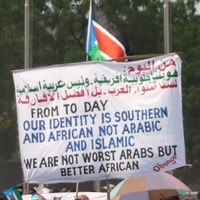![]()
Wed, July 20, 2011 | MEForum.org | FrontPageMag | by Raymond Ibrahim
Casual Hate: The Subtle Side of Christian Persecution
Earlier this month I participated in Coptic Solidarity’s Second Annual Conference in Washington D.C., titled: “Will Religious and Ethnic Minorities Pay the Price of the ‘Arab Spring’?” Panelists included Middle East specialists, prominent members of the Coptic community, and other minority leaders from the Muslim world, including Kurds, Berbers, and Sudanese animists.
Held at the U.S. Capitol, nine members of Congress made statements and showed their support, including Sue Myrick, Chris Smith, and Frank Wolf. Walid Phares, a Congressional advisor who also participated, asserted that their appearance is encouraging and indicates that at least some members of Congress “are aware about the plight of minorities in general and of Christian communities in the Arab and Muslim world, and are particularly concerned about the Islamist and jihadi threat to these communities.”
Because the conference spanned two days, I spent lots of time surrounded by Christian minorities. The casual anecdotes I heard, spoken not with outrage — the province of the privileged — but simply as backdrops to more mundane stories, revealed how endemic anti-Christian sentiment is to the Muslim world, so much so that Christians themselves have almost become immune to it, expecting it, reserving their actual complaints for times of physical persecution (including but not limited to Islamist-inspired theft, kidnapping, rape, church attacks, etc.).
In other words, if the formal speeches held at the Capitol documented the hostility and discrimination Christians face under Islam, the informal conversations, held over food and drink, drove the point home.
Thus one Coptic businessman complaining about how he lost a legal case in Egypt, though he was clearly in the right, was quickly interrupted by the grinning fellow across him, who asked whether his opponent was Muslim or Christian; when the businessman, rather coyly, said Muslim, everyone laughed knowingly, some even suggesting he was a fool for even going to court.
A women discussing her baby’s erratic sleeping habits revealed why: the mosque next door, which always blasts Koranic verses on the megaphone around 4 a.m., constantly wakes him up in terror and tears; and though the baby does not understand the words, the mother does, pointing out that most of the verses being blared are especially hostile to Christians, like 5:17, 5:51, and 9:29.
Any number of Copts looked at me incredulously when I inquired why a well qualified Copt did not bother applying to an important post in Egypt that seemed almost tailor-made for him: I was duly informed — that is, reminded — that best jobs are reserved for Muslims.
One refined-looking woman expressed her resignation: though a Christian, she sometimes wears the burqa in Egypt, simply so she can go about her daily business without being sexually-harassed, molested, called derogatory names, or spat upon (this recent story certainly validates her reasoning).
Some anecdotes were spoken in jest: one rather colorful Copt I bumped into in the restroom told me — between fits of laughter — how he once tried to use a mosque bathroom in Egypt; when the Muslims discovered he was a Christian, they chased him out, throwing shoes at him and calling him a “son of a bitch.”
Indeed, a resigned sense of humor seemed to pervade many of these stories — as if to say, “Since there’s nothing we can do about it, let’s make light of it.”
Other stories were spoken with stoic reserve. I have in mind the cigarette-puffing Assyrian couple from Iraq, who had lost everything to the unloosed forces of jihad — their home, their relatives, their business, their savings — and are trying to begin anew in America. Interesting was the man’s lament, that gone are the “good old days” — under Saddam — when Christians were afforded some protection.
As I listened to all these stories, I thought to myself, here is the great and unfathomable gap between the few formal reports on Christian persecution reaching a few American politicians, and the daily reality experienced by millions of Christians under Islam.
Raymond Ibrahim, a widely published author on Islam, is a Shillman Fellow at the David Horowitz Freedom Center and an Associate Fellow at the Middle East Forum.



 RSS
RSS











Casual Hate: The Subtle Side of #Christian #Persecution | #Egypt #Iraq http://bit.ly/oQTOMF
Casual Hate: The Subtle Side of #Christian #Persecution | #Egypt #Iraq http://bit.ly/oQTOMF